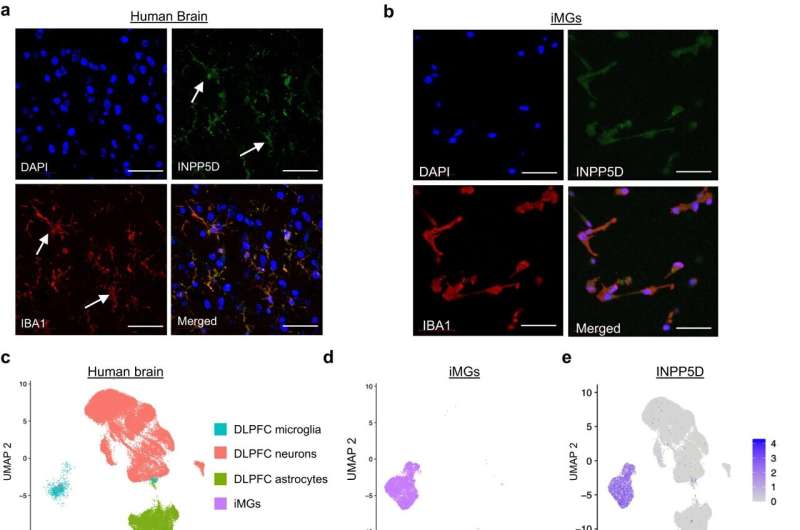This article has been reviewed according to Science X's editorial process and policies. Editors have highlighted the following attributes while ensuring the content's credibility:
fact-checked
peer-reviewed publication
trusted source
proofread
Researchers find connections between neuroinflammation and Alzheimer's disease

Immune-regulating brain cells known as microglia are known to play a role in the progression of Alzheimer's disease (AD). A new study by investigators from Brigham and Women's Hospital explores how the genetics of microglia contribute to neuroinflammation and, in turn, AD.
The team revealed that a reduction of INPP5D, a gene found in microglia, results in neuroinflammation and increases the risk for AD. Their results, which have important implications for the design of microglia-centered therapeutics for Alzheimer's disease and related disorders, are published in Nature Communications.
"We know that microglia play important roles in the healthy and diseased brain, but, in many cases the molecular mechanisms underlying this relationship are poorly understood," said corresponding author Tracy Young-Pearse, Ph.D., from the Department of Neurology at Brigham and Women's Hospital.
"If we're able to identify and understand the significance of specific genes that play a role in neuroinflammation, we can more readily develop effective, targeted therapeutics."
Neuroinflammation is important to monitor in people with neurodegenerative diseases, but it can be difficult to detect, especially in the early stages of AD. The earlier neurologists can identify it, the earlier they can treat it. Microglia are clearly involved in the process of neuroinflammation, but there are many unanswered questions regarding the molecular pathways involved.
The team used a variety of experimental approaches to probe the relationship between levels of INPP5D and a specific type of brain inflammation, activation of the inflammasome.
As part of their study, the team compared human brain tissue from patients with AD and a control group. They found lower levels of INPP5D in the tissues of patients with AD and when INPP5D was reduced, it activated inflammation. In parallel, they used living human brain cells derived from stem cells to study the intricate molecular interactions within microglia that mediate inflammatory processes with a reduction of INPP5D. These studies identified specific proteins that could be inhibited to block inflammasome activation in microglia.
Although the team's work represents the most comprehensive analysis of INPP5D in the AD brain, it remains to be determined whether INPP5D should be targeted with therapeutics. The team notes that their findings suggest INPP5D activity in AD brains is complex and future studies are needed to understand if INPP5D can be targeted to prevent cognitive decline in patients with AD.
"Our results highlight an exciting promise for INPP5D, but some questions still remain," said Young-Pearse. "Future studies examining the interaction between INPP5D activity and inflammasome regulation are essential to improve our understanding of microglia in AD and to help develop a comprehensive toolbox of therapeutics that can be deployed to treat each of the molecular roads that lead to AD."
More information: Chou, V et al, INPP5D regulates inflammasome activation in human microglia, Nature Communications (2023). DOI: 10.1038/s41467-023-42819-w


















